Energy Industry Sways Congress With Misleading Data
Want to listen to the story? Click here.
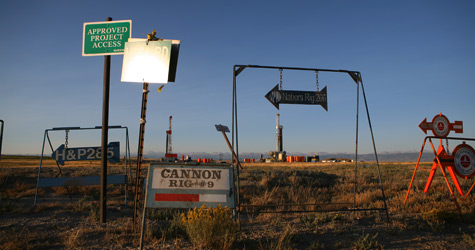
The two key arguments that the oil and gas industry is using to fight federal regulation of the natural gas drilling process called hydraulic fracturing -- that the costs would cripple their business and that state regulations are already strong -- are challenged by the same data and reports the industry is using to bolster its position.
One widely-referenced study (PDF) estimated that complying with regulations would cost the oil and gas industry more than $100,000 per gas well. But the figures are based on 10-year-old estimates and list expensive procedures that aren't mentioned in the proposed regulations.
Another report (PDF) concluded that state regulations for drilling, including fracturing, "are adequately designed to directly protect water." But the report reveals that only four states require regulatory approval before hydraulic fracturing begins. It also outlines how requirements for encasing wells in cement -- a practice the author has said is critical to containing hydraulic fracturing fluids and protecting water -- varies from state to state.
One recommendation in that report flies in face of industry's assertion that its processes are safe: hydraulic fracturing needs more study and should be banned in certain cases near sensitive water supplies.
Hydraulic fracturing -- where water and sand laced with chemicals is injected underground to break up rock -- is considered essential to harvesting deeply buried gas reserves that some predict could meet U.S. demand for 116 years.
In 2005 hydraulic fracturing was exempted from the Safe Drinking Water Act, based on assurances that the process was safe. But a series of ProPublica reports has identified a number of cases in which water has been contaminated in drilling areas across the country, and EPA scientists say they can’t fully investigate them because of the exemption.
Now, Congress is considering legislation to restore the Environmental Protection Agency's oversight of the process. And industry -- leveraging its money and political connections -- is using the recent reports to fight back.
Since January at least five studies have been published making the case that state laws (PDF) are adequate and that new regulations could hamper exploration (PDF), raise fuel prices and eliminate jobs. Three of the studies were paid for by the Department of Energy and produced by consulting firms that also work with the industry. One of the DOE reports (PDF) was written by the same person who authored a study for the Independent Petroleum Association of America (PDF)
The industry argues (PDF) that federal oversight would amount to a redundant layer of bureaucracy that is not needed because states already require the same environmental safeguards that might be required by the EPA, and that those safeguards are effective.
"We don't think the system is broke, so we question the value of trying to fix it with a federal solution," Richard Ranger, a senior policy analyst at the American Petroleum Institute, told ProPublica in May. "So proceed with caution if you are going to proceed with regulating this business because it could make a very significant difference in delivering a fuel that is fundamental to economic health."
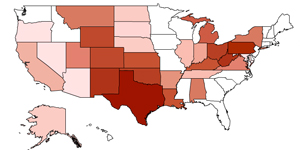 Industry reports say that if federal regulations are applied to hydraulic fracturing, more than a third of onshore gas wells would be closed and oil and gas companies would spend $10 billion complying with the law in its first year. The federal government would lose some $1.2 billion in revenue.
Industry reports say that if federal regulations are applied to hydraulic fracturing, more than a third of onshore gas wells would be closed and oil and gas companies would spend $10 billion complying with the law in its first year. The federal government would lose some $1.2 billion in revenue.
But advocates for the federal legislation say the industry is misleading the public into a false choice between the economy and the environment.
"We are all for using science-based information," said Amy Mall, a senior policy analyst for the Natural Resources Defense Council. "But the underlying information doesn’t really tell the story they claim it does."
Nonetheless, the arguments have gained traction in Congress and have eroded support for new regulation.
Rep. Dan Boren, D-Okla., told his fellow members in a recent hearing that "these folks are laying people off -- people are hurting in my district." Rep. John Salazar, D-Colo., who sponsored legislation to regulate fracturing in 2008, but declined to add his name to this year's bill, told ProPublica that "developers may have legitimate concerns about the impact that removing the exemption may have on their ability to find and extract oil and gas."
To keep the legislation alive, Diana DeGette, D-Colo., its main sponsor, has shifted gears to seek environmental studies and hearings rather than a quick passage into law.
"The opposition has been throwing out scare tactics and mischaracterizations of what she is trying to do," said DeGette's spokesman, Kristofer Eisenla. "Unfortunately the oil and gas guys came out of the barn storming."
Fuzzy Numbers
The study that has received the most publicity (PDF) is also among the most misleading.
The report, which evaluates the costs of regulations for the oil and gas industry, was written for the Department of Energy by a consulting company also used by the energy industry, Advanced Resources International, or ARI. It contains a table (PDF) listing seven specific processes it says would be mandated under the proposed federal regulations, and what those processes would cost -- a total of $100,505 per well. Among the listed items is "state of the art" fracture imaging, at a per-well average cost of $37,500, and three-dimensional fracture simulation, at a cost of $7,500.
But a footnote reveals that these figures are based on memo sent to a DOE official by another consulting firm in 1999. The report’s author said they haven’t been updated to reflect technological advances or substantial shifts in the drilling business over the last decade.
Furthermore, none of the tests listed in the table are mentioned in the text of Safe Drinking Water Act, the federal law that would apply to hydraulic fracturing, according to an EPA spokesperson in Washington. And they aren’t mentioned in the bill being floated in Congress either.
"It's a sense of magnitude of the impacts, not a sense of absolute accuracy," said Michael Godec, Vice President of ARI and author of the report. The regulatory requirements were interpolated on a "bad-case" scenario, he explained, because the federal laws are not specific. "We took some liberties. You have to make some assumptions about what might be required."
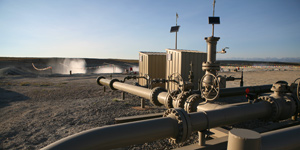 Godec believes that many of the processes listed in the report are already being practiced to a greater degree than they were in 1999, meaning that even if they were required they may not be additional burdens at all. But he said that anecdotal conversations with drilling companies confirm that the report’s conclusions are still “about right.”
Godec believes that many of the processes listed in the report are already being practiced to a greater degree than they were in 1999, meaning that even if they were required they may not be additional burdens at all. But he said that anecdotal conversations with drilling companies confirm that the report’s conclusions are still “about right.”
Godec said he did not obtain recent cost figures from drilling companies, which are closely guarded. Halliburton -- one of the largest hydraulic fracturing service providers -- did not return calls from ProPublica for comment about the expense of the procedures listed.
Asked whether the age of the data was a concern, Godec said it had been discussed with Nancy Johnson, the DOE official who commissioned the report. He said he was instructed that the report was needed quickly, that the budget was limited and that he should move forward because "this is a hot topic and people are testifying."
Nancy Johnson did not return calls for comment and the Department of Energy's office of fossil energy did not make its officials available for an interview after repeated requests. It said, through a spokesperson, that the Department did not author the report.
Godec also produced a similar report on costs and state gas regulations for the Independent Petroleum Association of America that was published in late April. Titled "Bringing Real Information on Energy Forward," (PDF) that report also makes the case that state regulations of drilling practices are effective. Godec says his company’s work is impartial and his conclusions would have been the same whether he was contracted by the oil and gas industry, or the federal government.
Even if the costs Godec laid out in the DOE report were up-to-date and accurate, it’s doubtful they would have the devastating financial impact the industry claims.
The estimated expense of regulating hydraulic fracturing amounts to between one and three percent of the total cost of drilling a new well when factored into operating costs estimated by financial analysts at Deutsche Bank. If all the testing that Godec includes is factored out, the regulations would cost the industry just $4,500 per well, according to his report, or just six hundredths of a percent of the cost of establishing a typical new well.
“I think at the end of the day it’s unlikely to have a real huge impact,” says John Freeman, a senior vice president for energy equity research at the investment bank Raymond James. “It’s a lot of fuzzy stuff that I can’t get my hands around. This just seems to be more of a soft number that I frankly have more of a hard time connecting the dots on.”
State Regulations Leave Gaps
In May the Ground Water Protection Council, a group made up mostly of industry representatives and state oil and gas regulators, released the first comprehensive review (PDF) of oil and gas regulations across 27 of 31 drilling states it surveyed. The report, paid for by the DOE, concluded that most states have requirements to encase wells in cement and protect groundwater, and that a majority also require they be notified after hydraulic fracturing takes place.
"The study confirms what the industry has been saying (PDF): that regulation of oil and gas field activities, including hydraulic fracturing, is best accomplished at the state level," the American Petroleum Institute said a press release about the study.
But the GWPC report -- which focuses on what regulations are in place, rather than what may be missing -- raises important points that are downplayed in its summary. It reveals that regulatory oversight is inconsistent from state to state and has substantial gaps. It also says hydraulic fracturing requires "comprehensive" further study "to determine the relative risk" and to determine best practices.
In fact, the report calls for some of same measures found in the congressional bill the industry is so hotly contesting.
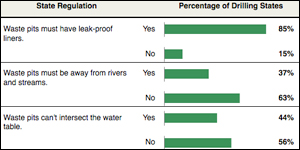 Regarding fracturing in areas close to the surface or near shallow aquifers, the report reads: "States should consider requiring companies to submit a list of additives used in formation fracturing and their concentration." It also says that shallow fracturing very close to certain drinking water aquifers "should either be stopped, or restricted to the use of materials that do not pose a risk of endangering ground water and do not have the potential to cause human health effects."
Regarding fracturing in areas close to the surface or near shallow aquifers, the report reads: "States should consider requiring companies to submit a list of additives used in formation fracturing and their concentration." It also says that shallow fracturing very close to certain drinking water aquifers "should either be stopped, or restricted to the use of materials that do not pose a risk of endangering ground water and do not have the potential to cause human health effects."
A close examination of the appendices (PDF) attached to the research also showed that 21 of the 31 states listed do not have any specific regulation addressing hydraulic fracturing; 17 states do not require companies to list the chemicals they put in the ground; and no state requires companies to track how much drilling fluid they pump into or remove from the earth -- crucial data for determining what portion of chemicals has been discarded underground.
"The tone is that in general states do an adequate job of protecting water," said Michael Nickolaus, the report's author, special projects director for the GWPC and former director of Indiana's state Oil and Gas Division. "There are certain gaps in certain states ... it’s not a hundred percent world."
The GWPC report does not name the states that lack more stringent regulations, a detail that is important because one or two states can account for a large proportion of the drilling in the United States. To extract that information from the report would require analyzing all the state regulations included in the appendices (PDF) and repeating much of the GWPC's original research. Nickolaus also declined to name the states in an interview with ProPublica, saying that the GWPC was obliged to protect its members.
Nickolaus says well construction -- especially the cementing process that keeps drilling fluids and gas from seeping into groundwater -- is more important than the fracturing issue. But according to the report, state regulations about cementing are sometimes vague and often don't specify standards that makes the protection fool-proof.
While most states have regulations that protect drinking water near the surface, a third don’t require that the cement casing extends far enough to completely isolate wells from geologic layers and the deepest aquifers, according to the report. Twenty-two percent don't require the cement to harden before the well is used for fracturing, and don’t test cement quality and consistency -- one of the surest ways to protect against contamination.

Fracking: Gas Drilling's Environmental Threat
The promise of abundant natural gas is colliding with fears about water contamination.
The Story So Far
The country’s push to find clean domestic energy has zeroed in on natural gas, but cases of water contamination have raised serious questions about the primary drilling method being used. Vast deposits of natural gas, large enough to supply the country for decades, have brought a drilling boom stretching across 31 states. The drilling technique being used, called hydraulic fracturing, shoots water, sand and toxic chemicals into the ground to break up rock and release the gas.



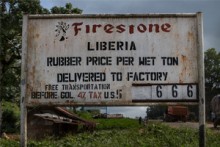
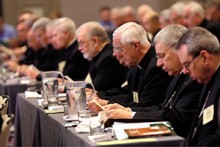


20 comments
DB
July 8, 2009, 8:05 a.m.
“Now, Congress is considering legislation to restore the Environmental Protection Agency’s oversight of the process.”
How many times will ProPublica repeat this outright lie before it stops? The truth - and you know it’s the truth - is that hydraulic fracturing has never been regulated by the EPA. The truth - and you know it’s the truth - is congress is attempting to give the EPA oversight over a process it has never overseen before.
This piece overall is a definite improvement on the truth meter from ProPublica’s earlier, whopper-filled pieces on this subject, but you obviously still feel the need to mislead your readers in order to maintain the pretense that there is something dangerous about hydraulic fracturing.
HF is one of the safest, most effectively-regulated industrial processes in the U.S. today. That truth is why the DeGette bill has lost its momentum. The days of ProPublica’s ability to blindly mislead the public and members of congress on this subject are over.
brutus6
July 8, 2009, 10:39 a.m.
I agree with DB’s comments. Abrahm Lustgarten and ProPublica’s article is chock full of misleading deception.
I would add that the prime reason industry is against direct EPA regulation of hydraulic fracturing (HF) is the Pandora’s Box nature of this and most all federal laws passed to regulate industry. Witness the recent 1,300 page Cap & Trade Tax bill just passed by Congress. No congressman voting on it had read it or really knew what was in it. Those congressmen enthusiastically voting for it didn’t even care what was in it; all that mattered to them was that it would greatly increase their power over American industry and the American people, and that it would generate a bunch of tax revenue for them to spend. To them “Protecting the Environment” is merely the excuse-du-jour to grab that power and our money.
Similarly, DeGette’s bill to give EPA power to regulate HF was broad and unspecific. ProPublica says industry cites added regulatory expenses like requiring 3D Imaging that aren’t mentioned in DeGette’s bill, and that is precisely industry’s point: If passed, industry knows it would be a free-for-all to the bureaucrats writing the regulations to go with the bill, with a bunch of EarthFirst(and to heck with the life, health, and security of the people living on it..) lobbyists telling them what regulations to write. God only knows the actual unnecessary added regulatory expense to each well should this bill become law.
The only sensible point cited in this story is that more study of the issue is required. I had to laugh when this anti-oil-industry writer Lustgarten said, “To extract that information from the report would require analyzing all the state regulations included in the appendices [21] (PDF) and repeating much of the GWPC’s original research.“ admitting that he was too lazy to review the research that went into the report. Industry says sufficient safeguards are already in place at the state level, but the anti-industry journalists like Lustgarten and ProPublica are too lazy to verify. That, or they are admitting they are too unqualified to understand and report on the technical aspects of oil and gas well completions and HF procedures.
Lustgarten’s laziness exemplifies why America is currently saddled with the socialist Obama government in the first place. Intellectually lazy Americans voted for Him because listening to His empty platitudes made them FEEL good. And Obama’s willing media accomplices were only too happy to help elect Him by putting His empty platitudes in 10 second soundbites all over tv and radio.
Trouble is the issue of oil and gas well completion and HF stimulation, and whether current state-level regulations are sufficient to protect the environment, are too complex to fit into 10 second soundbites. For once the intellectual laziness of Americans who helped elect Obama is a good thing. Apparently uninformed public interest can’t be raised high enough by the likes of ProPublica on this esoteric issue for Congress to quickly ram through another piece of bad legislation. Let the issue be studied thoroughly, let the bureaucrats propose specific regulations, and let those proposed regs be debated on their merits in full public view.
Mary Sweeney
July 8, 2009, 3:05 p.m.
There are two problems here. First, there is the question of what regulations are needed. Second, there is the question of how well the regulations will be enforced.
I live in upstate NY, and in the summer and fall of 2008, informational meetings and public hearings were held in our area on the issue of Marcellus Shale drilling. This drilling will be done with slick-water hydrofracturing—a process which, as ProPublica has reported—involves the use of dangerous chemicals. Many, many people who live in upstate NY are dependent upon private or municipal water wells for their water supply.
My husband attended one of the informational meetings; we both attended a public hearing. NYSDEC representatives were present at both meetings. We—and many other citizens who were present—were shocked by the degree to which the NYSDEC Division of Mineral Resources employees—who are paid by the taxpayers of NY state and are supposed to be working for us—were supportive not of the citizens of NY, but of the gas industry.
At the informational meeting, when asked how the DEC would know what was in the fracking fluid, a DEC official replied that they would request a sample from the gas company. My husband and others at the meeting were floored by this ridiculous reply. Obviously, what the gas industry sends the DEC may not be what they are fracking with—the correct way to get a sample would be for a DEC inspector to personally collect a sample of what is actually going into the ground at each well site. And each well site should be inspected frequently throughout the drilling process and also as gas production proceeds. Of course, this would be very hard to do in NY state since the NYSDEC only has about 19 employees to cover all of the wells that are drilled in the entire state. In order to adequately monitor the thousands of gas wells that have been proposed for NY Marcellus drilling, the NYSDEC would have to hire hundreds of additional employees—something that is very unlikely to happen at any time and certainly not during the current economic crisis.
Many NY residents, upon hearing of the proposed drilling, immediately began researching what has happened in other areas where shale gas drilling has occurred. The NYSDEC, on the other hand, complacently assured everyone that the Marcellus Drilling—which will involve thousands of horizontal wells, and SLICK-WATER hydrofracturing (a technique that is only about 12 years old), and which will occur in areas that currently have no gas wells at all—would be the same as the conventional gas drilling that has gone on in NY for the last 50 years. I am forced to conclude that the NYSDEC either did not understand what large-scale shale gas drilling would be like, or else that the NYSDEC simply lied to the public. Neither possibility is comforting.
Many of us feel that NY state government has abandoned the people who live and work and pay taxes in NY, and has decided to support the gas industry instead. If the same is true in other states, I suspect that this is the REAL reason why the gas industry does not want the EPA involved. I think the question we should be asking ourselves is: “What would properly trained, objective inspectors find if there were enough of them to adequately oversee operations at all of the drilling sites?”
If the drilling is as safe as the gas industry claims, then the gas industry should welcome proper oversight. Instead, the gas industry lobbied to get exemptions to a long list of federal environmental laws, including the Safe Drinking Water Act, the Clean Air Act, and the Clean Water Act. And they are lobbying now to try to hold on to that Safe Drinking Water Act exemption. Lobbying is an expensive undertaking. Draw your own conclusions.
TXsharon
July 8, 2009, 3:44 p.m.
If hydraulic fracturing is safe and the chemicals used are harmless, then why is industry protesting so much and why won’t they reveal the chemicals used?
Water is an essential resource that we must protect at all costs!
The reason the bill has lost momentum is because industry SPENT $44.9 MILLION LOBBYING AGAINST REGULATION IN THE 1ST QUARTER OF 2009 ALONE! Our Congress people are blinded by that money and they forget who elects them.
The reason industry is fighting so hard against regulation is their fear of LIABILITY and ACCOUNTABILITY.
Thank you Abrahm Lustgarten and ProPublica!
Sharon Wilson
resident of the Barnett Shale
Jerome Miller
July 8, 2009, 6:20 p.m.
From brutus 6
July 8, 2009 12:39 pm EDT
“No congressman voting on it had read it or really knew what was in it.”
To add this to you comment allows one to forget about reading the balance of what you typed.
All bills are written by the committees, or other government agency and too often, by lobbyist, with interest in the propose law.
No one could read all the bill, sent through the process. That’s why a committee system was set up. Be it good or bad.
Well, to my sorrow I did read on and thought (there I go again, thinking) I would type a comment to the comment by ‘brutus 6’ but after rereading that which came from the unit who, swing on what’s hangs between the teabags, hoping to dropped the product from the backside on our comment section. Sick so sick.
1: “For once the intellectual laziness of Americans who helped elect Obama…” THANKS: you nonintellectual lazy!
2: “God only knows the actual unnecessary added regulatory expense to each well should this bill become law..” CLUE: GOD would not get anywhere near you.
3: “with a bunch of EarthFirst(and to heck with the life, health, and security of the people living on it..) ” AND: this from one, who, we are trying to save the planet of.
4: “Lustgarten laziness exemplifies why America is currently saddled with the socialist Obama government in the first place. Intellectually lazy Americans voted for Him because listening to His empty platitudes made them FEEL good. And Obama’s willing media accomplices were only too happy to help elect Him by putting His empty platitudes in 10 second soundbites all over tv and radio. GEE: is it true you have the drugster and his people living off your money???
5: “....anti-industry journalists like Lustgarten and Pro Publica are too lazy to verify…” ..... “he was too lazy to review the research that went into the report.” LAZY: Type about being lazy??? the idea is to present the road way to the information, not to hand it to you on a oily platter. Then you look it up using the click and see to get to a site which will give you the information one would have thought you , by reading the article, wanted. (there I went, thinking again).
5 and last: ” Trouble is the issue of oil and gas well completion and HF stimulation, and whether current state-level regulations are sufficient to protect the environment, are too complex…” SO: uncomplex it for us. Pro Publica did there job and you tried to dump on it, SO?? You did not have any what we called in the old days footnotes. Lustgarten had 25+ and charts graphs and other sites listed. Type about LAZY it’s sure not Abrahm Lustgarten
Boy I wonder if this is how lush feels, after drinking his poison???
Wit loVe J Rome
Evan Romer
July 8, 2009, 7:36 p.m.
Every other industry has to comply with theSafe Drinking Water Act, and EPA regulations have not been excessively costly to them, so why the hysteria from the shale gas drilling industry? Despite their repeated assurances that hydrofracking is safe, I suspect that they know that the procedures they use and the chemicals they use are not safe, and they want to be allowed to continue to use them, public health be damned.
Even if we accept their figure of $100,000 per well at face value, that’s a small fraction of the cost of drilling a well. If that’s what it would cost to drill AND protect drinking water, why wouldn’t we do that? Why is that a bad thing?
Evan Romer
resident of the Marcellus Shale
linda taril
July 9, 2009, 10:34 a.m.
It’s great to see Lustgarten report that a group made up mostly of industry representatives and state oil and gas regulators, the Ground Water Protection Council, declared that shallow fracturing very close to certain drinking water aquifers “should either be stopped, or restricted to the use of materials that do not pose a risk of endangering ground water and do not have the potential to cause human health effects.”
This should give our Congress pause before providing hidden subsidies in the form of lax regulations to this GHG intensive and water contaminating hydrocarbon extraction industry. (more below).
But when Lustgarten reports that the industry is misleading the public into a false choice between the economy and the environment and then goes on to quote Amy Mall, a senior policy analyst for the Natural Resources Defense Council, we have to pause.
The NRDC has supported gas drilling for years showing it favors (short-term) economic gains at the expense of long-term contamination of the environment.
One of the conclusions of the report Lustgarten cites that hydraulic fracturing needs more study and should be banned in certain cases “near sensitive water supplies” mirrors the decisions of NRDC to pave the way for unregulated gas drilling in large swaths of our country, including in the rural, food-growing area of the Marcellus Shale.
It’s bad enough that NIMBY organizations like the Damascus Citizens for Sustainability working with the NRDC would cuddle up to out-of-state politicians like NY Representative Hinchey, NY State Assemblyman Brennan and NY City Council Member James Gennaro who use the same ‘sensitive environmental areas’ language to signal to industry that the Susquehanna Watershed is open for Drill, Baby Drill! while the Catskill Delaware watershed feeding their homes should be protected. But we don’t have to take for granted that fracking is here to stay.
Lustgarten focuses - like EarthJustice and the NRDC - on only one of the core environmental statutes from which gas drilling was exempt in the 2005 Halliburton Energy Policy Act. Why? There are a dozen + other statutes which were granted exemptions in that same bill (all at once!). All of those exemptions together are the Halliburton loopholes and the NRDC/EarthJustice are trying to hoodwink us to allow the continued subsidizing of the gas industry by not having to conform to these basic environmental laws.
Is that the role of an environmental organization or a corporate shill? (and, yes, I know that they have done some good things here are there - they need to maintain credibility). My organization got sent their testimony to the New York City Counsel from a group in New Mexico. These guys are supporting drilling in upstate New York’s rural areas. Repeal of the exemption from only the Safe Drinking Water Act will not protect those areas b/c the SDWA only protects ‘public water supplies’ and those areas like most of america is supplied by private wells. So why are they not pushing for a repeal of all the ENVIRONMENTAL STATUTE exemptions AT ONCE? That’s a good question for this reporter to delve deeply into (and look at their polluting industry-friendly environmental actions and the constitution of their Board of Directors etc.).
Finally when Lustgarten reports uncritically that “(h)ydraulic fracturing . . . is considered essential to harvesting deeply buried gas reserves that some predict could meet U.S. demand for 116 years that’s the last straw:
Is our ‘clean energy future’ to be powered by toxic, GHG-intensive extractive processes? When industry uses the term ‘clean’ they are implying it is an environmentally suitable alternative to coal and oil.
And when groups like the Sierra Club and NRDC promote the notion that it is ‘transitional’ or ‘bridge’ fuel, shouldn’t Lustgarten also be asking THEM where are their studies of GHG per BTU for marcellus or barnett etc. shale gas when all factors - land clearance, diesel motor (from compressors and trucks hauling water to and from wells), production of fracturing fluids etc. - are considered?
And why aren’t they planning for a carbon-free economy by 2050 as is eminently possible if sellout environmentalist organizations would use their funds invested in Bank of America and Carlyle Group (w/ethanol infrastructure holdings like NRDC) to demand it.
TXsharon
July 9, 2009, 11:58 a.m.
Linda, it’s hard to tell where you stand on the drilling issue. When you rail against our supporters you only enable industry.
I realize some people in your area are mad because NRDC didn’t support a drilling moratorium in your area. Do you realize what a NIMBY that makes you in my eyes?
Sharon Wilson
resident of the Barnett Shale
Mary Sweeney
July 9, 2009, 1:26 p.m.
Even though I do not agree with everything Linda says, I think that there is a part of Linda’s post that is right on the mark. It is relevant not just to the state of NY, but to the entire world. Here it is:
“And when groups like the Sierra Club and NRDC promote the notion that it is ‘transitional’ or ‘bridge’ fuel, shouldn’t Lustgarten also be asking THEM where are their studies of GHG per BTU for marcellus or barnett etc. shale gas when all factors - land clearance, diesel motor (from compressors and trucks hauling water to and from wells), production of fracturing fluids etc. - are considered?”
As Linda noted, extracting gas from shale is a very energy-intensive undertaking which requires that many trees be cut, that vast quantities of diesel fuel be used, that roads and pipelines be built, and that water treatment plants be built to handle disposal of wastewater. Methane, which is a much more potent greenhouse gas than carbon dioxide, is both intentionally and accidentally vented from gas wells, pipelines, and, sadly, from contaminated water wells.
As far as I have been able to tell after quite a bit of searching, very little study of the overall greenhouse gas contribution from these processes has occurred. So yes, natural gas burns cleaner than coal or oil, but when the extraction of the gas is taken into account, is the overall GHG contribution of natural gas really that much lower than that of coal or oil? The answer seems to be: “we don’t know.”
The atmosphere does not care about politics, it does not care about the good intentions of the Sierra Club or the NRDC or any other environmental group: the atmosphere is just going to follow the laws of physics, and if shale gas extraction puts a lot of GHG into the atmosphere, our planet is going to keep getting warmer and warmer and warmer.
As a long-time supporter of quite a few environmental groups, I have to say that I am very disappointed that so many of these groups are pushing the idea that natural gas is “clean” even though there has been so little study of the GHG contribution of the extraction and production processes.
I confess that it was not until shale gas drilling came to my own neck of the woods that I began to research the issue and to fully understand how destructive this type of drilling is. Shame on me for not paying attention sooner. And shame on any environmental group that promotes natural gas usage while downplaying the very destructive local (and possibly global) effects of gas extraction. We can all do better, and I hope that we will.
Amy Mall
July 9, 2009, 1:38 p.m.
NRDC’s position on natural gas production is clear and simple: Greater energy efficiency is the fastest, cheapest way to lower energy costs and reduce global warming pollution. Natural gas can help in the short term, but it is not an answer in the long term. Our energy future must not depend on fossil fuels. Investments in efficiency cost less than drilling and bring benefits to the market faster than trying to increase supplies. We must incentivize energy efficiency and support development of renewable energy sources. NRDC does not support natural gas drilling at the expense of long-term contamination of the environment; rather we believe that, where drilling does occur, industry should use the best practices available to protect air, water, land, human health, and property. We believe the technologies are readily available, and that adopting them can be a win-win solution for the industry and the environment.
Nor when it comes to the environmental impacts of oil and gas production does NRDC only focus its work on hydraulic fracturing. We are involved in litigation and policy efforts on other environmental aspects of oil and gas production including greenhouse gas emissions, air pollution, water pollution, toxic waste, harms to human health and communities, and destruction of wildlife habitat. NRDC is working to close all environmental loopholes available to the oil and gas production sector, including those in the Clean Air Act, Clean Water Act, and Resource Conservation and Recovery Act. We believe there are readily available, affordable, and often profitable solutions.
Should anyone want more details, they can find extensive information posted on our website including: Finding the Balance: The Role of Natural Gas in America’s Energy Future; and Drilling Down: Protecting Western Communities from the Health and Environmental Effects of Oil and Gas Production.
This ProPublica article rightly points out there is a lot of misinformation circulating regarding this topic.
Mary Sweeney
July 9, 2009, 4:08 p.m.
I would like to thank Amy Mall for posting here and for providing links to the NRDC’s documents on gas drilling. I am familiar with these documents and I recommend them, as they contain a lot of good information. And I fully support the NRDC’s call for energy efficiency and renewable energy sources.
Make no mistake: the NRDC has done a great deal of good work on this issue, and I am grateful for their efforts. But I still maintain that large-scale shale gas drilling is extremely destructive at the local level, and that we simply do not know how much GHG it is contributing to the global warming problem. Natural gas is not a “bridge”—it is just a continuation of the same old fossil fuel errors that have gotten us into trouble in the past.
As you will see if you read the above documents, the NRDC places a great deal of emphasis on preserving pristine areas. I do not mean to single out the NRDC—many other environmental organizations take the same approach. This is understandable because they have limited financial resources and the pristine areas are becoming increasingly rare and precious. I fully support the protection of these special areas! However, I also believe that if it is to have a real and lasting impact, environmentalism must fully encompass not just the pristine areas of our world, but also the areas in which we live and work and raise children.
Millions of people live in shale areas that the gas industry already has or hopes to develop. The danger presented by the fracking fluid is just one problem in a long list. (For example, serious air pollution is another problem. Methane contamination of water wells can occur even if dangerous fracking chemicals are not used. Gas wells are located near homes and water wells, and even when “best practices” are used (and they seldom are) accidents can occur.) This is an extremely serious issue of direct relevance to many, many people and I wish that all of the large environmental groups would give it the publicity it deserves. If they did, maybe we could get the exemption to the Safe Drinking Water Act repealed!
The need for public education on this issue is critical: I would like to thank Abrahm Lustgarten and ProPublica for their series of articles on gas drilling.
carbontradingisasuperscam
July 9, 2009, 6:47 p.m.
Mary,
Thank you for the lucid and gentle post.
a few notes on how NRDC is avoiding answering the questions:
i. NRDC is not supplying the scientific basis for claiming that gas is
a environmentally sound ‘transitional’ fuel. Where are the lifecycle
studies regarding GHG/BTU for “unconventional” gas production?
And where has NRDC proposed how we could preempt the extremist gas
industry from capping a producing well once we’ve exceeded safe ppm of
atmospheric carbon (now at 390 or so) in a ‘play’ which they estimate
would supply 116 years worth of US GHG-belching hydrocarbon energy use?
ii. NRDC is not explaining why they did not pursue the tried-and-true
Halliburton method of advocacy for *our* cause (and ostensibly
theirs). Halliburton demanded and got exemptions all-at-once in the
2005 Energy Policy Act. Why isn’t the NRDC - whose mission supposedly
includes protecting the environment from the damaging impacts of gas
drilling demanding an all-at-once repeal of all these exemptions of
fundamental environmental statutes?
You would think that an environmental group working so closely with
the Congressional Reps who drafted it, would have rallied its members
to repeal ALL of the Halliburton exemptions.
Instead we have only the call for repeal of the SDWA exemption which,
as we’re told by OGAP, Earthworks and the Environmental Working Group
(with whom NRDC works closely), would allow hydraulic fracturing “in
formations isolated from drinking water sources would face *little
regulatory burden*.”
http://www.ewg.org/Safe-Drinking-Water-Act-Should-Cover-Hydraulic-Fracturing
What does that mean? These pro-gas drilling “environmental”
organizations know full well that by ‘drinking water sources’ what is
actually referred to are the *public* drinking water sources which
supply 25 or more households. Most of the US landmass would not benefit.
The NRDC is pursuing a divide-and-conquer (or sacrifice) approach to
re-regulating gas drilling.
If the FRAC act (NRDC’s and DeGette/Hinchey et al’s bill) passes, most
of the areas of the Marcellus Shale would not benefit from the
traditional federal environmental statutes repealed by Halliburton’s
Congress. And these areas are not protected by what would be the
reinstatement of the lone SDWA.
DeGette’s staffer told me that I should contact Amy Hall at the NRDC
for more information about why the bill failed to call for all the
other key environmental statute exemptions to be repealed.
But we know why. NRDC is not rallying its members or lobbying our
Congress for as rapid as possible a transition from a fossil fuel
based economy to a non-carbon based one. They are sacrificing
communities and rural areas which are supplied by individual private
wells for the ‘clean’ ‘transition’ energy they promote with the
effective subsidy of zero protection of the Clean Water Act, the Clean
Air Act, NEPA (and the dozen other environmental laws which they
loophole from their advocacy).
Isn’t it the mission of real environmental groups to insist that core
environmental statutes be respected?
Here’s the NRDC in action elsewhere:
http://www.oilwatchdog.org/articles/?storyId=27518
Susan Leni
July 10, 2009, 11:04 a.m.
I live in the middle of the Marcellus Shale. Along with 90% of the population in this area, we will not benefit from the gas drilling. This area of New York IS a national treasure. It is prime agricultural land with pristine water. This will be destroyed for a “transitional fuel”. The NRDC and other groups should be ashamed of themselves for supporting an activity that threatens to destroy 30 percent of the world’s water,pollute the air and cause an already poor area to become even poorer. The people here don’t have the resources to take care of the health of the people who will be affected by these chemicals and the air pollution. What are the people to do when the asthma starts sky rocketing in this area, when the people start getting cancer at high rates. No one I know here even has health insurance. There is no money. That the NRDC would support drilling in a major agricultural area is extremely irresponsible. I wonder how much money is coming from oil and gas corporations to support the NRDC and other groups like them?
Susan Leni
sophieg1
July 11, 2009, 8:24 a.m.
Thank you for keeping this issue on the front and center and please do not stop. Environmental concerns should be a top priority in Congress/Senate. I do not know why more is not being done. Oh, could it be that its time to start campaigning for the next elections???
Seriously, the Democracts (at least they say they are not Republicans) have a majority and should use this opportunity to change for the better all they can.
StillWind
July 12, 2009, 2:07 p.m.
These comments are like the mud from a well.
First, it is up to each state to protect its citizens. People need to focus on their own representatives, before they continue to support a huge federal bureaucracy that has always proven to be ineffective at best and dangerous in general.
While I am behind protecting water quality, you lost me when you jumped to the CO2 craziness. You need to keep your religion out of this and stick to the facts.
Natural gas is an excellent fuel that we will need to rely on into the next century, and while protection for the health of the environment and the people who use it must be in place, the idea that we can get off carbon based energy systems is simple science fiction, unless you kill off 90% of the population.
Mary Sweeney
July 12, 2009, 9:14 p.m.
Every other industry has to obey the Safe Drinking Water Act, the Clean Air Act, and the Clean Water Act. The gas and oil industry should have to obey these laws too. These laws were passed to protect ALL Americans, including those Americans who live in states where drilling takes place.
Susan Leni
July 13, 2009, 5:08 a.m.
StillWind,
I don’t know where you got “CO2” from but if you are talking air pollution, gas drilling is a major player. First the thousands of wells that will be drilled, then the hundreds of diesel trucks with the millions of gallons of water, the fracking chemicals, the compressors to create the pressure to frack, all diesel for each well. Then you have the diesel compressors used to frack. All diesel, all going into the air, then you have the gas compressor stations. We have three stations that will be going in near us. All diesel. The compressors could run up to 50 years, noisy and again diesel. Yes stillwind I think that you better pray for a high wind when they come and drill around you. Diesel fumes are a known carcinogen. Diesel is why I will lose my home nevermind the possible loss of my water. The fumes will come right into our house. The noise will be unbelieveable. We do not need natural gas as a transition fuel. We created a glut when the gas prices went up. By conserving. That’s all Americans have to do.
Conserve. Oh my. Imagine that.
Susan
Nicholas Migliaccio
July 13, 2009, 3:49 p.m.
Lets face one fact here. Once contaminated, there is NO WAY to EVER undo a plume contaminating an aquifer. This is not something to be experimented with. Debate if you will whom should deal with it, but once done, it is to be regretted forever.
Yes more regulation will increase the cost of energy. OK
if that is the TRUE cost of energy, we either pay it or transfer it to someone else. Not paying the TRUE cost of energy causes MIS-ALLOCATION of capital. Probably the worst thing that could happen. As a financially aware person, I think this is the worst dynamic out there.
thats my 2 cent.
dg
http://denaliguidesummit.blogspot.com/
StillWind
July 13, 2009, 11:15 p.m.
It’s not likely that the enormous regulation and taxation that is being prepared for the American people will in any way result in a TRUE cost of energy. It is simply a way for the current administration, and those to follow to soak the American people for more of our hard earned money.
Everyone wants a clean environment, and No One wants polluted water, not even the “evil oil companies”. The resulting litigation could be staggering, resulting in even more cost to the American people as we all pay higher energy costs.
The bottom line is the the Federal Government has never once done a job more efficiently than the private sector, and local government is always preferable to an out of touch federal bureaucrat.
Reagan said it clearly, and it’s still true. the last thing anyone wants to hear, especially in time of disaster is “I’m from the government, and I’m here to help.”.
TXsharon
July 17, 2009, 9:08 a.m.
Dr. Al Armendariz of SMU has a peer reviewed study that says 29% of all the gas produced escapes as fugitive emissions. That’s methane, the most powerful greenhouse gas escaping into our atmosphere. Any cleaner burn advantage of n. gas is canceled out by the production.
Commenting on this story is closed.